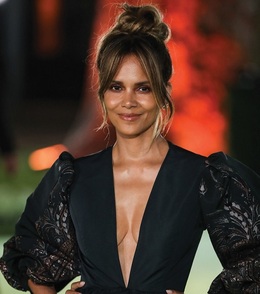
More than three decades into her film career, and with her 60th birthday approaching in a few years, Halle Berry could easily choose to slow down and let her past accomplishments speak for themselves. After all, she has achieved so much since first gaining notice in the early 1990s by playing a drug addict in Spike Lee’s Jungle Fever and Eddie Murphy’s love interest in Boomerang, capped off by her historic Oscar win for 2001’s Monster’s Ball. She remains the only Black woman to be honored as Best Actress by the Academy.
In addition, Berry has enjoyed success as Storm in the X-Men movies and as a bikini-clad Bond girl, and made interesting choices like the multiple roles she played in Cloud Atlas and by portraying an astronaut in Extant.
Not just that, in recent years she has spent time on the other side of the camera as a producer and director. Yet as much as we admire the star’s ability to combine the creative detail and delivery of acting with a more regimented and restricted eye on the craft of film, ultimately the cinema-going public has missed the sumptuous spark for which she became known all those years ago.
Now, it appears she has it back. Not only did she shine in one of Netflix’s biggest summer hits—the action-comedy The Union with Mark Wahlberg—but her latest part in the horror film Never Let Go is sure to leave an impact on audiences as well.
South Jersey Magazine spoke to Berry about the new movie, her professional pursuits outside of acting and her most important role as the mother to two children.
What can you share about your new movie, Never Let Go?
I play Momma, who has two boys who were born in this house and it’s the only home they’ve ever known. Their entire world consists of how far they can venture into the woods before the ropes tied to them stop their progress.
That’s all they’ve ever experienced. Growing up, they’ve had to rely solely on the land to survive. The house contains only what was left behind a decade ago when they were born, and they’ve had to make do with those limited resources.
To stay alive, they must hunt and gather whatever they can find in the woods—squirrels, frogs, insects, worms, rabbits—whatever the forest offers. Their survival is heavily dependent on the season, rainfall and the availability of water.
Life has been incredibly harsh for them. The ropes are their lifeline, keeping them safe from the dangers of the world. The house is their sanctuary and staying tethered to it is crucial for their survival. If the rope snaps, they become immediately vulnerable to the malevolent forces that inhabit the forest.
That sounds intense! How did you feel when you were approached to play the role?
It was sold to me so elegantly by the director, Alexandre Aja. He said the house was almost like a protective prison but ruled by Momma as a way of making sure the boys come to as little harm as she can control. It was an idea that really fascinated me and I enjoyed it from start to finish.
How do you approach a role like this when, even though there a lot of post-apocalyptic movies and TV shows, this is something unique?
I had to take a long time to figure out how I was going to approach it. Looking at the script, it wasn’t clear what had gone on before because when we meet the characters, the boys are 10 years old.
So, I had to try to work out what their experiences were, what they had been through, and how they would react to new events. Then, I wanted to decide whether Momma was of sound mind and how she really treated the boys. How did they feel about their situation? Was her attitude caused solely by something in the woods or was she actually going mad? If she was mad, what are the tell-tale signs? Are there really monsters out there?
However, the boys ultimately begin to question her methods, whether anything is actually as she says it is. The fact it’s only been the three of them for 10 years and they’ve had no interaction with any other people—that’s got to affect all of them in different ways. Especially when she loses control of them.
Where has their dad gone?
You will see him and you’ll begin to understand him, but there aren’t a whole load of flashback elements. The story paints the picture for the viewer.
You’ve said that the location was perfect for the movie. Where was it?
Shooting was in the middle of the woods in British Columbia, in Vancouver. So, the situation and the environment were exactly like you will see in the movie. There was no other set and we spent a lot of time there together, which I think worked really well for the boys, as well. They had no distractions [and] we all got to know each other so well. We were ensconced in each other and in the plot. It just worked.
It’s interesting to see your pride at working with children on this, as you’ve always talked about wanting to resonate with the new or the next generation, be that your own children or just the movie and TV watchers, right?
Of course. I want to create or act in cinema that enables an audience to see themselves, to relate to that, and to feel proud of what they see. I think that’s really important, otherwise what’s the point?
Since dominating the film scene at the turn of the millennium, you’ve made a conscious move to dedicate more time to your business and entrepreneurial ambitions. In fact, you have your own production company and 50% ownership in a lingerie company (Scandale). How big a part of your life is that now?
It’s incredibly important to find something you are passionate about. We all want to work harder and grow in what you do, and I never wanted to be that person who said, ‘Thank God it’s Friday.’
Where does your work ethic come from?
My mother, definitely. From her I learned that if you’re going to succeed in business you need to be very hands-on; you need to inspire the people who work for you and, in the same way, you also need to be tough at times; but it all comes down to hard work. That is what people respect, and that makes for a much better workplace. You also get more done.
You are in a relationship with musician Van Hunt, but also proudly regard yourself a single mother, right?
That is correct. If I’m not with the father, I don’t want anyone but me to raise my children. That has to be my duty and I would never put it on another partner or a new partner to perform that function. That just wouldn’t seem fair.
Anyway, my children make me a better individual and give so much meaning to my life. They’ve helped me discover a lot about myself and also given me more joy than I ever expected. I waited a long time to start a family—I was 41 when I had Nahla. I had to figure out a lot of things first and when I finally had my first child, I felt ready for that responsibility.
How has your experience as a mother changed you?
I think I’m pretty much the same person I’ve been for most of my life. I feel I’ve grown a lot and discovered a lot of things about myself and about life during that time. But my spirit is the same. My children have fulfilled a need in me, though.
I have strong instincts as a mother, and I’ve experienced so much pure joy looking after them and feeling that I have a beautiful family around me that I can share my life with. It’s the best kind of feeling.
You’re generally recognized as one of the most beautiful and fittest women in Hollywood. How do you stay in such great shape?
As a diabetic, I’ve had to be careful when it comes to paying close attention to what I eat and leading a healthy lifestyle. I had no choice, but it’s paid off for me. I’ve also tried to be a role model for other people who have diabetes and show that you can lead a very productive life and not let it hold you back.
I think taking care of your body also makes you feel more confident and energetic overall, and I’m sure it makes me feel more positive about my life in general. I mean, it’s not rocket science, right?
Your image is that of an actress who always seems to be playing very serious women facing very difficult situations, as you've done in films like Monster’s Ball, Things We Lost in the Fire or The Call. Yet you seem much more light-hearted in person.
[Laughs] I’ve played so many dark or serious characters in my career that it’s hard for people to separate me from them. I’d rather people think of me as Jinx in Die Another Day because she has a sense of fun that I also have when it comes to looking at the world.
I’ve had my struggles in life but I’m not a tortured soul like some of my screen roles. This is actually one of the lightest times in my life and I feel that so many good things have been happening to me of late. It’s just that as an actor you’re attracted to the heavy and serious stuff because that’s where the great drama tends to be found.
Yet I’ve always said I will jump at the chance to do a good comedy, so maybe that answers your observation?
So how do you see your life evolving now?
I’m enjoying every moment of this time in my life. I have a wonderful family, I’m doing interesting work, and I feel that my children make my life more beautiful every day.
Click here to subscribe to the free digital editions of South Jersey Magazine
To read the digital edition of South Jersey Magazine, click here.
Published and copyrighted in South Jersey Magazine, Volume 21, Issue 7 (October 2024)
For more info on South Jersey Magazine, click here.
To subscribe to South Jersey Magazine, click here.
To advertise in South Jersey Magazine, click here.












